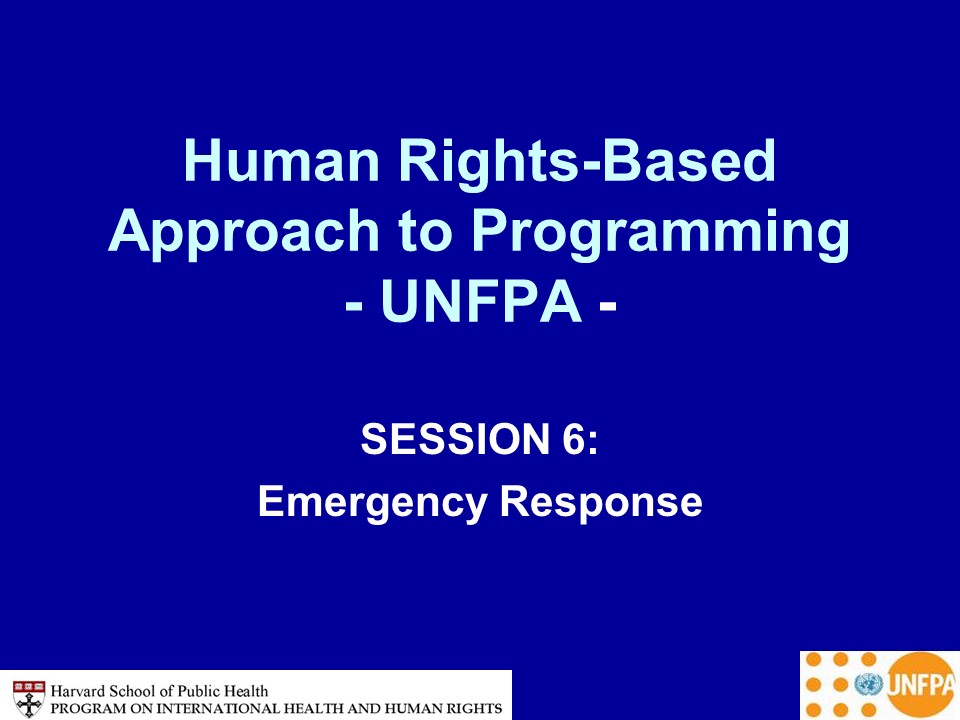Human Rights-Based Approach to Programming - UNFPA - - PowerPoint PPT Presentation
Title:
Human Rights-Based Approach to Programming - UNFPA -
Description:
Human Rights-Based Approach to Programming - UNFPA - SESSION 6: Emergency Response The limited capacity and unwillingness of the government to commit resources to ... – PowerPoint PPT presentation
Number of Views:154
Avg rating:3.0/5.0
Title: Human Rights-Based Approach to Programming - UNFPA -
1
Human Rights-Based Approach to Programming-
UNFPA -
- SESSION 6
- Emergency Response
2
Session Overview
- Introduction to UNFPAs work in emergency
preparedness, humanitarian response and
post-crisis recovery and transition - UNFPAs general principles
- The four phases
- Natural disasters
- UNFPAs focus areas for reproductive health
- UNFPAs focus areas for gender
- UNFPAs focus areas for population and
development - Conclusions
3
Introduction
- Central role of promoting data collection,
reproductive health and rights, gender equality
and womens empowerment in humanitarian
emergencies - Goals to build knowledge of and commitment to
- importance of gender and reproductive health and
reproductive rights issues in crisis and
transition - improve technical and institutional capacities to
incorporate principles from ICPD into emergency
preparedness, response and recovery
4
UNFPAs General Principles
- Committed to promotion and protection of human
rights during emergency response, regardless of
the type of emergency - Whether political crisis, natural disaster, or
post-conflict situation, UNFPA guided by human
rights and principles noted in CEDAW, the ICPD
Programme of Action, and Resolutions 1308, 1325
and 1820 of the Security Council
5
The Four Phases
- Emergency preparedness and contingency planning
- Acute emergency response
- Chronic humanitarian situations
- Transition and recovery
6
A HRBA to Emergency Response
- Added value of a HRBA to emergency response
- strengthening UN and government accountability to
affected populations - promoting participation and inclusion, thereby
reinforcing a culturally sensitive approach - responding in a non-discriminatory manner to
reduce disproportionate impact of emergencies on
most vulnerable subpopulations
7
UNFPAs Role in Humanitarian Reform
- Three elements of humanitarian reform
- cluster approach
- humanitarian coordinators
- Central Emergency Response Fund (CERF)
- UNFPA is co-responsible for three areas in
existing clusters - reproductive health (Cluster health)
- gender mainstreaming (Cluster Early recovery)
- prevention and response to gender-based violence
(with UNICEF) (Protection Cluster) - UNFPA is also a lead agency for mainstreaming
gender across all clusters
8
Accountability and Rule of Law in Humanitarian
Response
- Disseminating and sharing findings with
rights-holders and duty-bearers - Establishing redress mechanisms for survivors of
sexual and other forms of violence - Zero-tolerance policy Supporting the obligation
of the UN to those receiving humanitarian
assistance
9
HRBA and Natural Disasters
- Applying same fundamental HR concepts and
principles when supporting a family planning
programme or assisting in a post-conflict setting - Participatory and inclusive HRBA promotes
understanding of local knowledge and traditional
warning systemsa critical aspect of natural
disaster response - Be familiar with available guidelines and tools
for natural disasters, such as the IASC
Operational Guidelines on Human Rights and
Natural Disasters
10
UNFPAs Focus Areas for Population and
Development in Emergencies
- Collection of data on partners capacities and
available service providers - Rapid assessments
- Post-conflict evaluation
11
UNFPAs Focus Areas for Reproductive Health in
Emergencies
- Protecting and promoting reproductive health and
rights in emergency and post-emergency settings - Supporting programmes to increase access,
availability , acceptability and quality to
emergency sexual and reproductive health services - Reinforcing the capacities of survivors to claim
their rights to be assisted and protected
12
UNFPAs Focus Areas for Gender in Emergencies
- Protection of women and girls who are survivors
of gender-based violence - Supporting programmes to increase access,
availability , acceptability and quality to
medical, psychosocial support and legal services - Capacity-building of womens and community
organizations to promote and protect rights.
13
Conclusion The Value Added of a HRBA in
Emergency Response (1)
- UNFPA recognizes and accounts for different
emergency phases and types of emergencies at
hand. - Fundamental elements of a HRBA apply to the
response regardless of the phase or type of
crisis or activity. - Challenges are raised for programming in
emergency/chronic humanitarian situationsBUT a
HRBA can still be implemented.
14
Conclusion The Value Added of a HRBA in
Emergency Response (2)
- UNFPA supports government efforts to promote
accountability and transparency by working with
its partners to quickly disseminate the findings
of rapid health and mortality assessments and
fact-finding missions to the government and local
organizations. - Ensuring the inclusion and participation of local
groups in emergency response activities helps
UNFPA promote a more culturally sensitive
response by providing valuable insight about the
value systems and social hierarchies of those
communities living in humanitarian crises.
15
Conclusion The Value Added of a HRBA in
Emergency Response (3)
- UNFPA assists partners in taking steps to
recognize and combat social stigmas and other
forms of inequality faced by vulnerable groups
that are often exacerbated in emergency
situations to ensure equality and
non-discrimination.
16
Conclusion The Value Added of a HRBA in
Emergency Response (4)
- Some of the biggest challenges faced by UNFPA in
humanitarian emergencies - - the limited capacity and unwillingness of
the government to commit resources to sexual and
reproductive health and other services - Important long-term components
- - increasing budgets for excluded groups
- - working to translate this commitment into
available, accessible, acceptable and high
quality services
17
Conclusion The Value Added of a HRBA in
Emergency Response (5)
- UNFPA collaborates with large number of
NGOs/CSOs, UN agencies, government offices and
international humanitarian groups when responding
to emergencies - Given indivisibility, interdependence and
interrelatedness of human rights, diverse group
of actors are required to respond to the
different but linked human rights that require
protection - Application of the key HR principles, as well as
the 3AQ elements, can facilitate and strengthen
UNFPAs humanitarian response work































